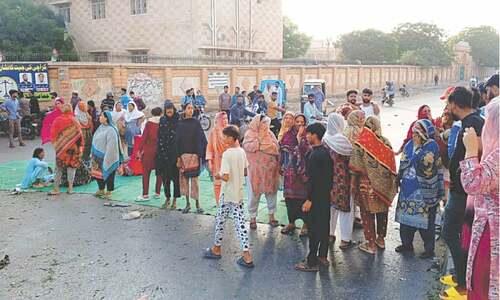KARACHI: An antiterrorism court has sentenced a police officer to death in a case pertaining to killing of a citizen in a staged encounter two years ago.
The judge of the ATC-XVI, who conducted the trial in the judicial complex inside the central prison, pronounced his judgement reserved after recording evidence and final arguments from both sides.
The judge noted that the prosecution successfully proved the charges against Assistant Sub-Inspector Tariq.
The judge also ordered him to pay Rs200,000 in compensation to the legal heirs of the victim — 27-year-old Maqsood.
However, the judge exonerated three co-accused — constables Abdul Waheed, Mohammad Shaukat and Akbar Khan — of the charges due to lack of evidence against them.
Meanwhile, the court issued perpetual warrants for the arrest of an alleged absconding suspect, Ashiq Hussain Chachar.
According to the prosecution, all four police officers had killed Maqsood, who was travelling in a rickshaw, and injured rickshaw driver Abdul Rauf on Sharea Faisal on January 18, 2018 and painted the incident as an encounter between police and robbers.
The prosecution had accused ASI Tariq of killing the victim, while his colleagues Akbar and Waheed were charged for not adopting proper strategy to arrest the robbers and trying to conceal the facts about the killing of a citizen.
The prosecution said that ASI Tariq and Akbar were armed and they did not adopt a proper strategy to arrest the robbers, adding that the former’s firing had left Maqsood dead and the rickshaw driver wounded and they all together tried to hide the facts.
Initially, the case was registered against unidentified persons as police claimed that the victim had actually been killed by the firing of the robbers while they were attacking the police.
Later, on the orders of a sessions court, the case was lodged on the complaint of Maqsood’s father, who claimed that his son was killed by the policemen and not by the robbers.
Later, Section 7 (punishment for acts of terrorism) of the Anti-Terrorism Act, 1997 was inserted in the first information report on the recommendation of the investigation officer.
Published in Dawn, November 25th, 2020















































